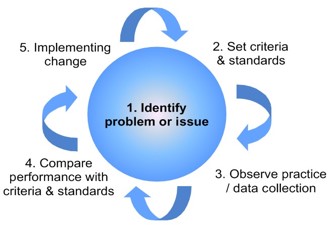Shown below are the Evidence-Based Course Development (EBCD) Feedback Forms that you can use to help guide the development of your class. To view a summary list of the various guideline, click on the following picture:

To begin accessing the guidelines, click on the titles or images below for the specific Tier that you are interested in. As you will see, there are three Tiers that the guidelines can be used for: 1) Courses & Instructors, 2) Students, and 3) Administration (e.g., Programs, Divisions, etc.). In the handouts section of this page, you will find more resources to support both your understanding and use of these guidelines. We are also available to support you in your use of these resources.
 |
Courses & Instructors: These guidelines provide insights into how to progressively transform classes into high impact teaching and learning environments. |
 |
Students: These guidelines can provide learners and those helping them with insights into how to be more effective in their study habits and strategies. |
 |
Administration: This set of guidelines is intended for program directors, division chairs, department heads, deans, et cetera. They can provide guidance on the kinds of resources and support that can have a significant impact on teaching and learning. |
Mission-Centered Considerations: Contrary to a "values neutral" view of education, education at mission-centered institutions seek to engage in teaching and learning in ways that positively transform students and the communities they are a part of. These guidelines, which are embedded across the areas above, provide insights into some of these considerations.
A Few Words of Caution: Overall, the general assertion is that the higher a course scores in each of the guidelines, the greater the likelihood of improved student learning and development. As a result, one of the tendencies is to expect that the highest level be attained for each and every guideline. However, this may not always be appropriate. For example, different disciplines and content/skill areas may be more strongly aligned with some guidelines than others. In addition, the investment of time and energy needed to modify a course so that it moves to a higher level of development (e.g., from Level 2 to Level 3) for a specific guideline may not always be warranted, especially if the majority of students in that course are already performing at proficient levels. In other words, the goal of these guidelines is not necessarily to achieve the maximum level of development for every guideline but rather to use them to help one to better discern which modifications will likely result in the most improvement in student learning and development.
In addition, as you will see, these feedback forms were created based on a synthesis of various evidence-based resources and rubrics. As a result, they still need to be evaluated for reliability and validity here at the college (as should all standardized assessments that are adopted).